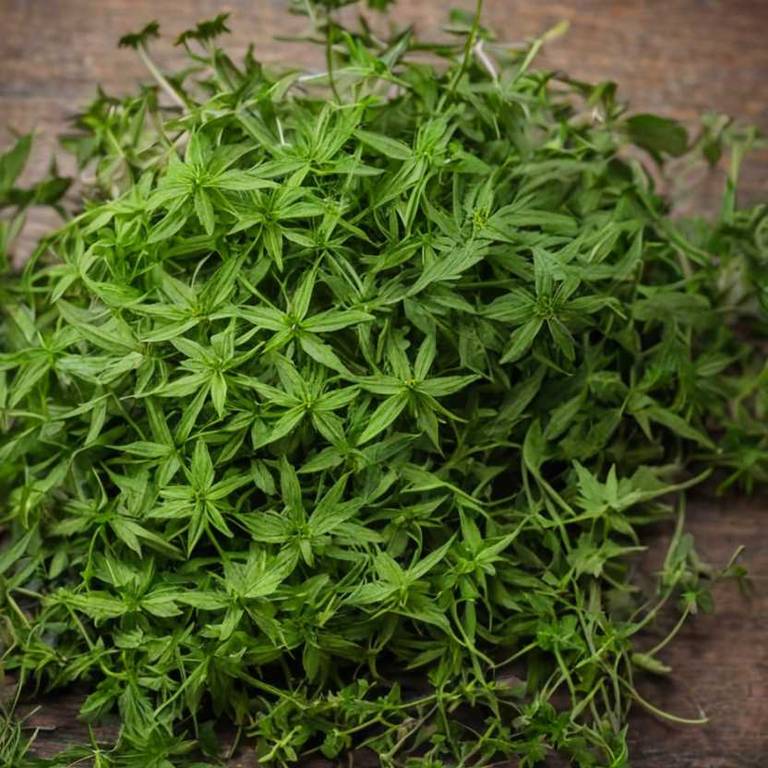Beggarticks (Bidens pilosa)
Beggarticks (Bidens pilosa) is a member of the Asteraceae family, native to South America, Central America, and Caribbean. Traditionally, its leaves, stems, and flowers have been used for decoctions, infusions, and powders.
This herb is particularly valued for its anti-inflammatory, bitter, and diuretic actions, and has a long history of use in african traditional medicine, native american herbal medicine, and european herbal medicine.

Quick Facts / Key Information
| Common Name | Beggarticks |
|---|---|
| Scientific Name | Bidens pilosa |
| Plant Family | Asteraceae |
| Genus | Bidens |
| Species | pilosa |
| Native Range | South America, Central America, Caribbean |
| Plant Parts Used | Leaves, Stems, Flowers |
| Primary Medicinal Actions | Anti-Inflammatory, Bitter, Diuretic |
| Primary Traditional Systems | African Traditional Medicine, Native American Herbal Medicine, European Herbal Medicine |
| Historical Preparation Methods | Decoction, Infusion, Powder |
Botanical Identity
- Scientific Name
- Bidens pilosa
- Common Name
- Beggarticks
- Synonyms / Alternative Names
- Cudweed, Pilose Tickseed, Sticktight Charlie
- Plant Family
- Asteraceae
- Genus
- Bidens
Botanical Description
- Growth Habit
- Perennial herbaceous plant.
- Height
- It typically grows to a height of 30 to 100 centimeters.
- Leaves
- Opposite, ovate leaves with dark green upper surface and lighter green lower surface, bearing prominent stomatal bands along the midrib.
- Flowers
- Inflorescence composed of solitary to clustered capitula with yellow disc florets and white to pale yellow ray florets, actinomorphic, with 5 lobed petals and 5 toothed lobes on the involucre.
- Stems
- Erect, branched, hairy, with opposite, leafy nodes and sparsely pilose surfaces.
Traditional Uses / Historical Use
Traditional Systems
- African Traditional Medicine
- Native American Herbal Medicine
- European Herbal Medicine
Historical Preparation Methods
- Decoction
- Infusion
- Powder
- Poultice
Medicinal Actions
- Anti-inflammatory
- In herbal literature, noted as a calming anti-inflammatory, in tissue-soothing contexts.
- Bitter
- Traditionally described as a soothing bitter, for digestion-related formulations.
- Diuretic
- Historically regarded as a cooling diuretic, in fluid-regulation contexts.
- Tonic
- Commonly referenced as a gentle tonic, for broad-use formulations.
Active Compounds
- Flavonoid
- A group of naturally occurring compounds commonly present in many flowering plants.
- Tannin
- High-molecular-weight phenolic compounds found in many plant species.
- Phenolic Acid
- A class of aromatic plant compounds commonly found in leaves, seeds, and stems.
- Coumarin
- Plant-derived compounds often associated with fragrance-related chemistry.
Modern Research Overview
This section is reserved for future summaries of scientific research related to this plant. As additional verified sources are reviewed, relevant study information will be added here.
Safety & Contraindications
- General Precautions
- General precautions have been noted regarding the use of this herb.
- Contraindications
- Specific contraindications associated with this herb have not been well documented.
- Allergies
- There is insufficient evidence to determine whether this herb commonly causes allergic reactions.
- Drug Interactions
- The potential for interactions with prescription medications has not been extensively studied.
- Toxicity
- The toxicity profile of this herb has not been clearly established.
- Pregnancy & Breastfeeding
- Information addressing pregnancy and breastfeeding-related safety for this herb is limited.
Preparation & Usage Methods
- Infusion
- Infusions are commonly prepared using hot water to release aromatic and soluble components.
- Decoction
- Plant parts are gently boiled in water to release soluble constituents.
- Poultice
- Plant parts are crushed or moistened and placed directly on the body.
- Powder
- Plant parts are dried and mechanically reduced to a powdered form.
- Extract
- Extracts are created by dissolving plant material in a suitable non-alcoholic medium.
Growing, Harvesting & Storage
Growing / Cultivation
- Soil
- Prefers loamy soil with well-drained conditions. Typically grows best in organically rich soils.
- Sunlight
- Thrives in full sun. Tolerates full sun to partial shade.
- Watering
- Prefers moist soils. Tolerates periodic dry conditions.
Medical Disclaimer
The information provided on this page is for educational and informational purposes only. It is not intended to diagnose, treat, cure, or prevent any medical condition. Always consult a qualified healthcare professional before using any herb for medicinal purposes.